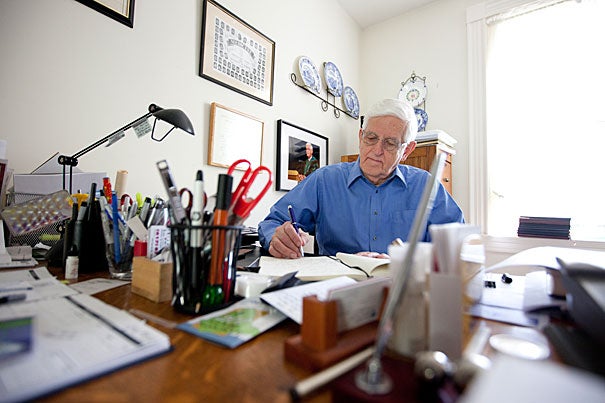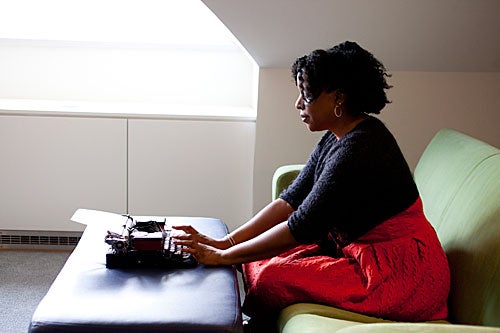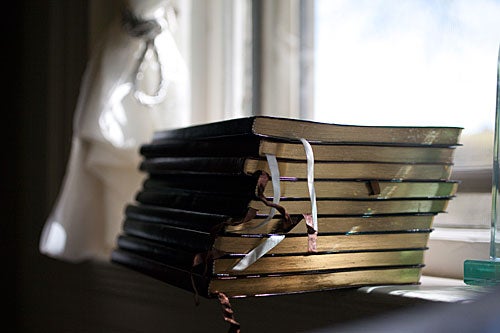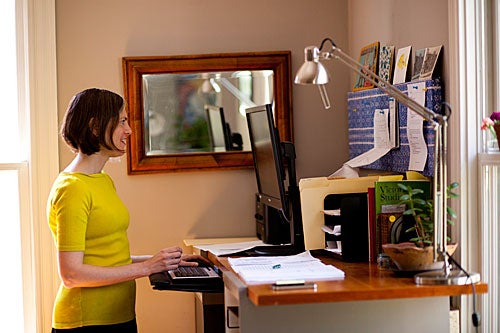
“I began a journal over 40 years ago when I arrived at Harvard Medical School as chief of neurology at Massachusetts General Hospital. Entered were moments of history, both familial and those arising from work, which formed the threads for what I would later weave together into my memoir, ‘Alfalfa to Ivy,'” said Joseph B. Martin, former dean of Harvard Medical School, pictured here in his Brookline home.
Rose Lincoln/Harvard Staff Photographer
Where the magic happens
Harvard authors offer sneak peeks into their writing lives
The Gazette asked several Harvard authors to talk about something different, not about their books themselves but about where and how they write them. Here’s what they said.
Tayari Jones
Author of “Silver Sparrow” (Algonquin Books, May 2011)
Composing on an antique typewriter forces me to work a little slower, makes me pay closer attention to every word. I love the little bell that lets me know every time I’ve made it to the end of another line. And it doesn’t hurt that my 1919 Royal doesn’t have Internet access. That helps me stay focused.

Ideally, I write in the early morning. It’s a peaceful time of day, and there’s no one else awake competing for my attention. I say “ideally” because I’ve worked hard to train myself not to have any requirements for writing, only preferences. I want to know that I can do it anywhere and anytime, so that I never feel that my magic feather has been taken away from me. I love my typewriters, but I would use finger paints if that were all that was available.
Joseph B. Martin
Author of “Alfalfa to Ivy” (University of Alberta Press, August 2011) and an avid journal keeper
Inspiration arrives at strange times — day or night, often during the awakening moments of the middle hours of the sleep period. A memory flashes across consciousness — the event rendered vivid as I write it down in cursive longhand— including in the description the emotional triggers that follow. One becomes an observer of one’s own memories.

I began a journal over 40 years ago when I arrived at Harvard Medical School as chief of neurology at Massachusetts General Hospital. Entered were moments of history, both familial and those arising from work, which formed the threads for what I would later weave together into my memoir, “Alfalfa to Ivy.” Creative writing is hard work, but enormously gratifying. I came to know my quirks and idiosyncrasies — insights not likely to have been gained otherwise.
Leah Price
Editor of “Unpacking My Library: Writers and Their Books,” and more recently, “How to Do Things with Books in Victorian Britain” (Princeton University Press, April 2012)
After I injured my back two years ago by hunching too long over my laptop, I found that I could write more comfortably standing up than sitting down. So I began to migrate around the house, perching my laptop on the kitchen counter or balancing it on the mantelpiece as if it were the latest digital-age knickknack. (I am shorter than Thomas Wolfe, who rested his writing paper on top of the refrigerator.)

A neighbor who happens to be a gifted carpenter had slipped a disc lifting heavy equipment, so he could not only sympathize but empathize with my predicament. He stuck blocks of wood underneath each leg of my desk, which now stands on tiptoe like a dancer en pointe.
With a work surface almost as tall as I am, I can pace around the room between sentences. My new writing environment is probably the only thing I have in common with the most vocal fan of stand-up desks, Donald Rumsfeld.




